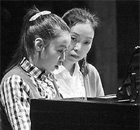Society
Inmate dies at labor center; family cries foul
By Wang Jingqiong (China Daily)
Updated: 2010-04-15 07:21
 |
Large Medium Small |
BEIJING - A 37-year-old severely underweight inmate died last Friday at a reeducation-through-labor center in Tangshan city, Hebei province.
Dong Xiongbo, who lived at the center for nearly a year, was 179-cm-tall but weighed only 35 kg when he died at a local hospital.
Dong's family alleged his death was a result of "too much work and lack of timely medical treatment".
| ||||
Reeducation-through-labor, or laojiao, an administrative measure adopted in 1957, empowers the police - instead of the courts - to sentence a person guilty of minor offenses to a maximum of four years' incarceration.
During their time at the center, the inmates receive education and are required to do labor.
Shen Chengzhe, the deceased's cousin, said Dong was given the task of making 8,000 pairs of chopsticks each day until he fell ill last October.
"He told us (last October) he had fallen ill because he had worked too hard the past 10 days. But he was still forced to work until this February when he fainted," Shen said.
"Instead of taking him to a hospital, the center only gave him some painkillers.
"He told us the center wouldn't take him to a hospital because he didn't have money. So we sent some money to him in March," said Shen.
On March 18, the center told Dong's mother to go to the hospital, where Dong was admitted.
When Dong's mother saw him, she knew he was "too sick" to be cured.
"He was so skinny and weak, like a skeleton, and the doctor told me he couldn't be saved," said Dong's 69-year-old mother. "He has no wife or children and he was my only son."
The center on Wednesday refused to comment on Dong's death, saying the Justice Bureau of Tangshan is investigating the case.
The investigation team, led by the bureau, denied the family's allegations.
Zheng Yingxiang, deputy procuratorator of the Procuratorate of Tangshan, said Dong died of tuberculosis.
"After our investigation into the case, we didn't find any of the allegations, which the deceased's family has levied, to be true," he said.
Zheng said the supervisors at the center had been "very humane" and sent Dong to the hospital three times, adding that the officials at the center even paid for his treatment once when his family could not be reached.
But Dong's family is certain the local government is trying to manipulate the truth.
Shen said the doctor who was treating Dong told him he did not die of tuberculosis, but of severe malnutrition.
"We don't want any money or compensation. We just want the truth. We want to know why my cousin died and who is responsible," Shen said.
Ma Huaide, a law professor at the China University of Political Science and Law, said although people's personal freedom is taken away in labor centers, their health and right to life should still be protected.
"If Dong really died due to the workload and lack of timely medical treatment, the officials of the center should be held responsible," Ma said.
Chen Xin contributed to this story.
China Daily











